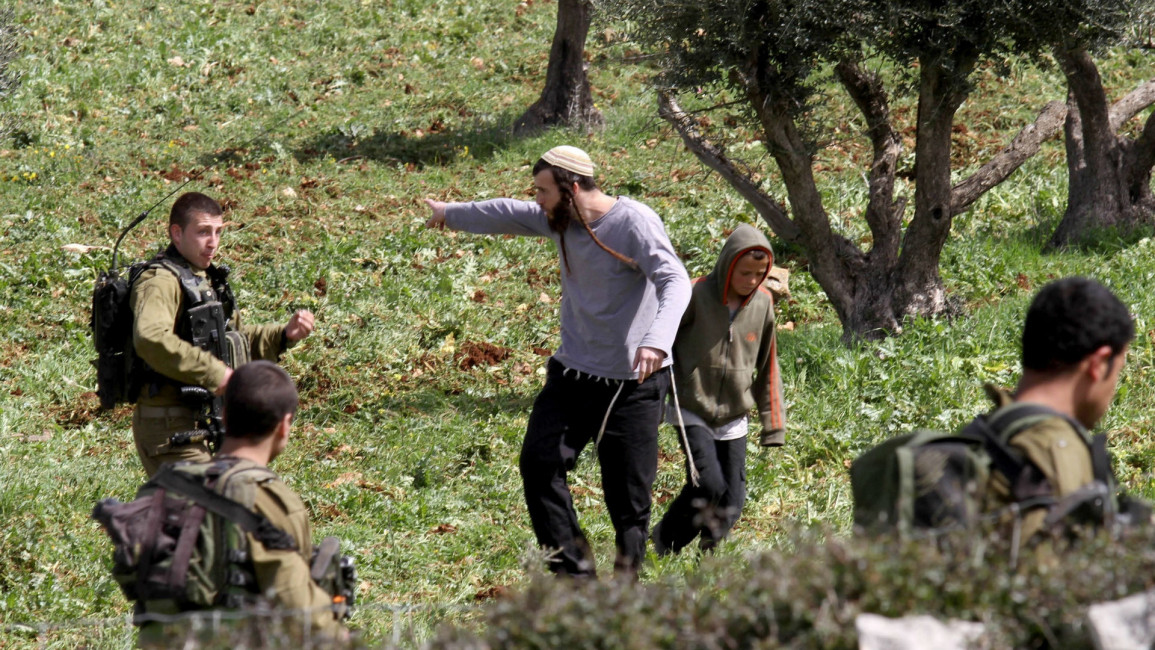Israel legalises hundreds of West Bank settler houses
Israel legalises hundreds of West Bank settler houses
Israel has retroactively legalised hundreds of settler homes that the international community has deemed illegal.
2 min read
Settlers have been accused of harassing Palestinian residents [AFP]
Israel has retroactively legalised some 800 homes in four settlements in the occupied West Bank, the interior ministry said.
They included 377 homes in the Yakir settlement, 187 in Itmar and 94 in Shilo in the northern West Bank, as well as 97 more in Sansana in the south of the occupied Palestinian territory, it said.
The decision was taken two weeks ago, but was only reported in the Israeli press on Friday.
It came at a time of heightened tensions between Israelis and Palestinians in the occupied territories, Jerusalem and Israel.
The international community regards all Jewish settlements in the West Bank as illegal, but the Israeli government makes a distinction between those it has authorised and those it has not.
The wildcat outposts, often little more than a few caravans, are notorious for housing young Jewish hardliners, referred to in Israel as "hilltop youth".
Settlements and outposts are seen as major stumbling blocks to peace efforts as they are built on land that Palestinians see as part of a future state, and fuel frustration among Palestinian youth.
Israeli Prime Minister Binyamin Netanyahu has faced major criticism internationally for refusing to halt settlement expansion.
"These aren't new constructions but rather homes built in settlements recognised by Israel in areas that until now didn't have any urban planning," said Hagit Ofran, a spokeswoman for Israeli settlement watchdog Peace Now.
"Even if it doesn't have the same impact that the announcement of new settlements would, it's undeniably a gesture from Netanyahu," she said.
The recent violence in the West Bank has given ammunition to the Israeli pro-settlement lobby, commentators say.
Israel last announced new settlements in July when the government authorised 300 new settler homes to be built in Bet El in the central West Bank.
Israel occupied the West Bank in the 1967 Six-Day War in a move never recognised by the international community.
They included 377 homes in the Yakir settlement, 187 in Itmar and 94 in Shilo in the northern West Bank, as well as 97 more in Sansana in the south of the occupied Palestinian territory, it said.
The decision was taken two weeks ago, but was only reported in the Israeli press on Friday.
It came at a time of heightened tensions between Israelis and Palestinians in the occupied territories, Jerusalem and Israel.
The international community regards all Jewish settlements in the West Bank as illegal, but the Israeli government makes a distinction between those it has authorised and those it has not.
The wildcat outposts, often little more than a few caravans, are notorious for housing young Jewish hardliners, referred to in Israel as "hilltop youth".
Settlements and outposts are seen as major stumbling blocks to peace efforts as they are built on land that Palestinians see as part of a future state, and fuel frustration among Palestinian youth.
Israeli Prime Minister Binyamin Netanyahu has faced major criticism internationally for refusing to halt settlement expansion.
"These aren't new constructions but rather homes built in settlements recognised by Israel in areas that until now didn't have any urban planning," said Hagit Ofran, a spokeswoman for Israeli settlement watchdog Peace Now.
"Even if it doesn't have the same impact that the announcement of new settlements would, it's undeniably a gesture from Netanyahu," she said.
The recent violence in the West Bank has given ammunition to the Israeli pro-settlement lobby, commentators say.
Israel last announced new settlements in July when the government authorised 300 new settler homes to be built in Bet El in the central West Bank.
Israel occupied the West Bank in the 1967 Six-Day War in a move never recognised by the international community.


![President Pezeshkian has denounced Israel's attacks on Lebanon [Getty]](/sites/default/files/styles/image_684x385/public/2173482924.jpeg?h=a5f2f23a&itok=q3evVtko)



 Follow the Middle East's top stories in English at The New Arab on Google News
Follow the Middle East's top stories in English at The New Arab on Google News


